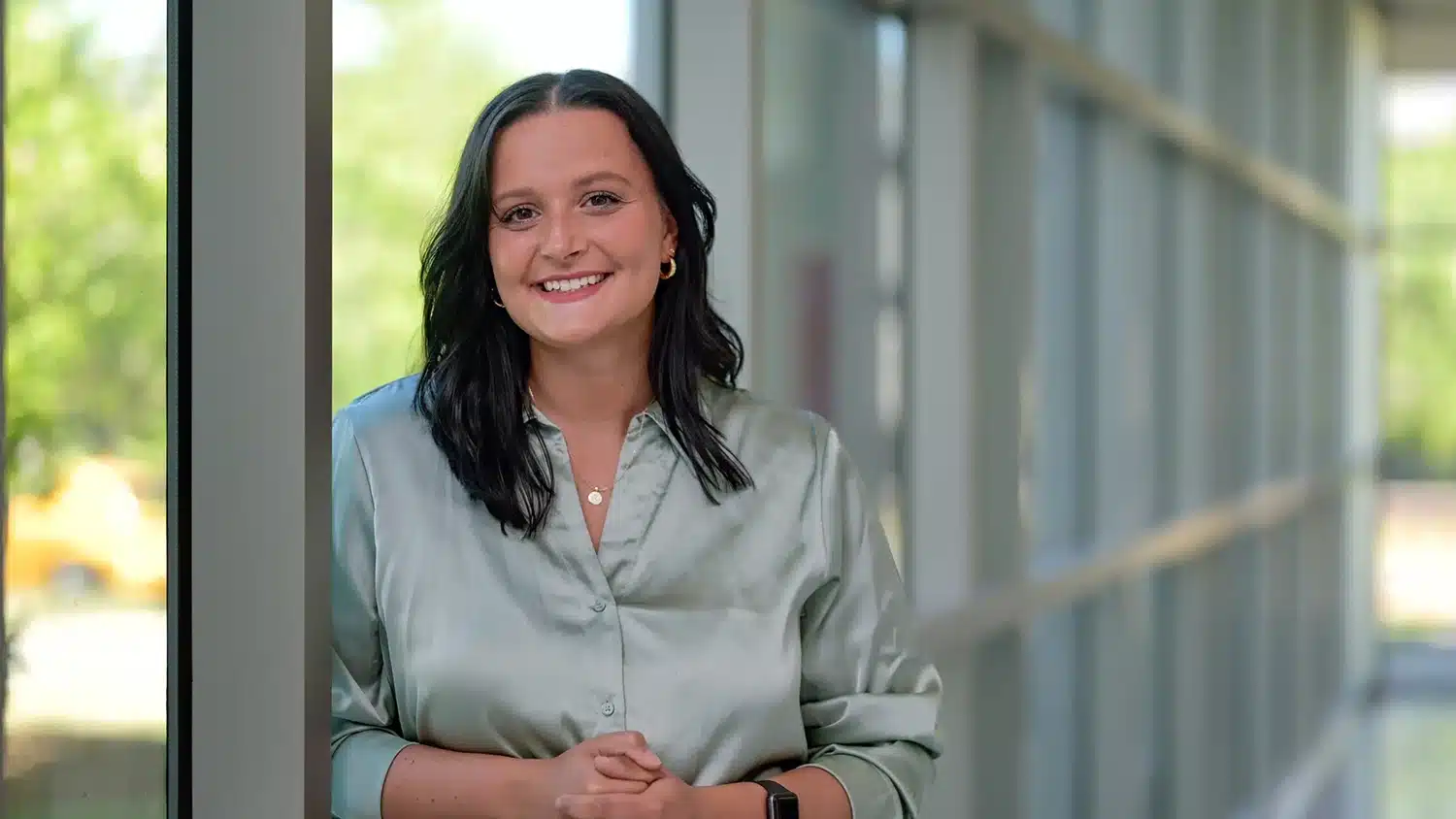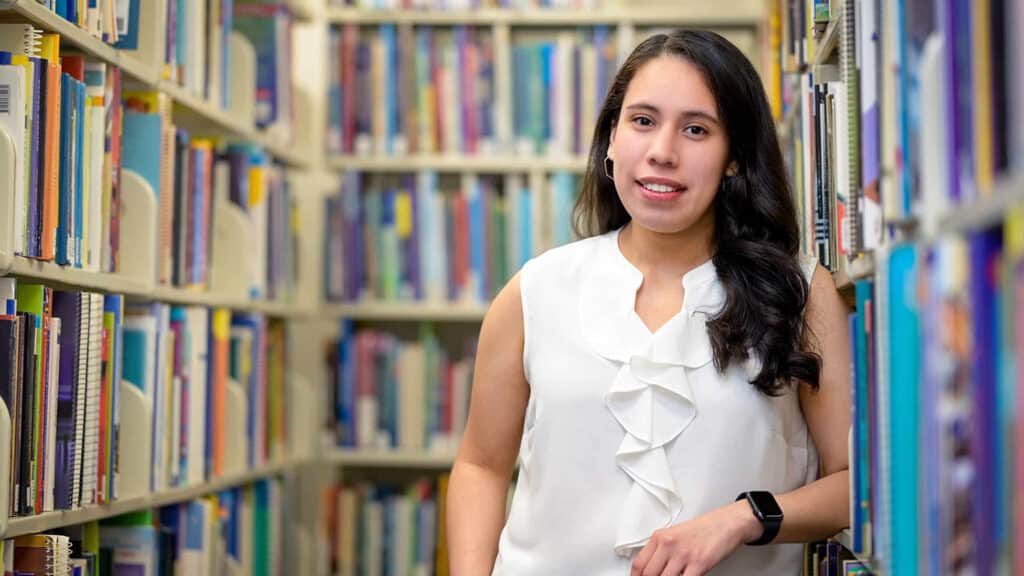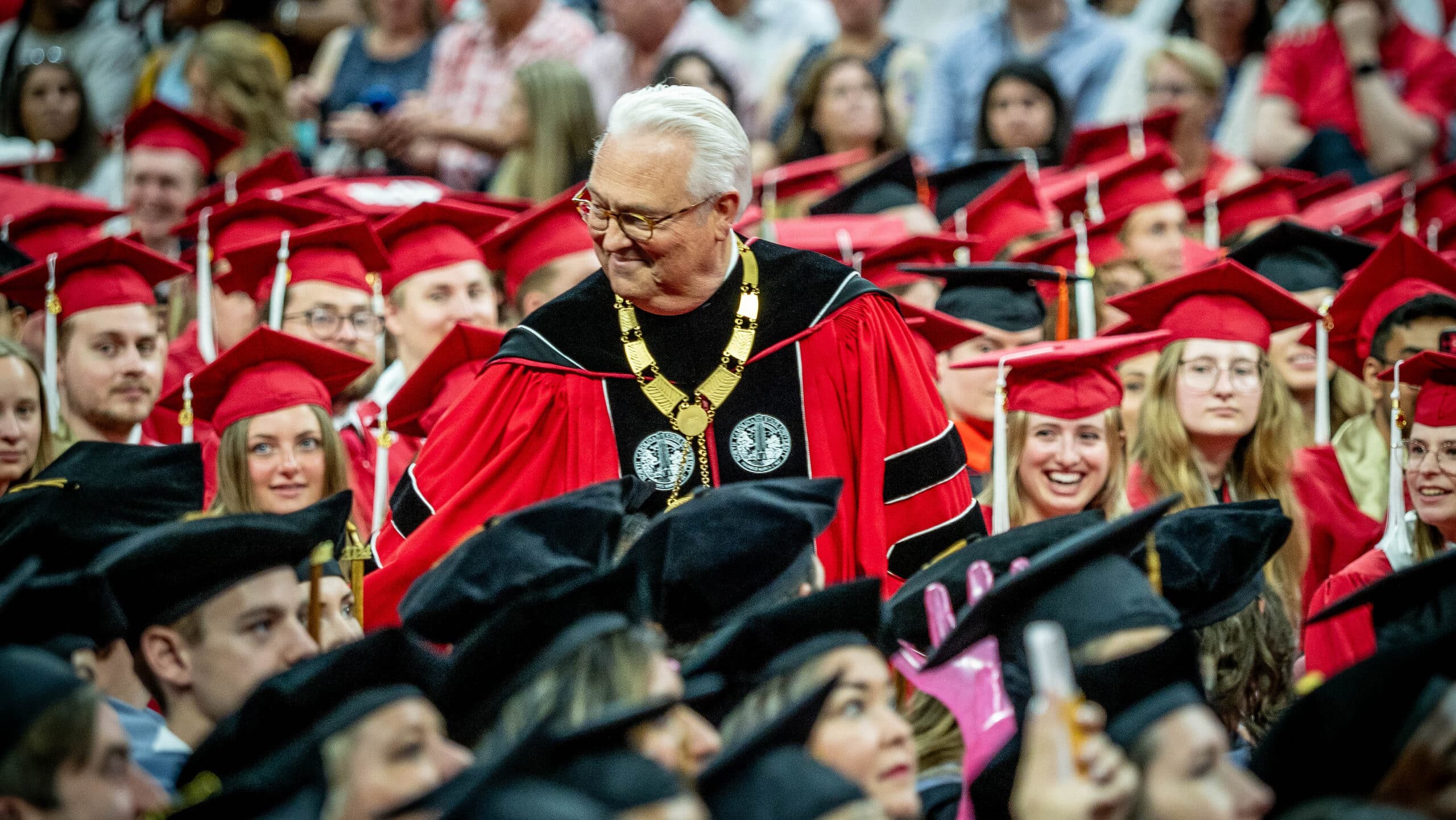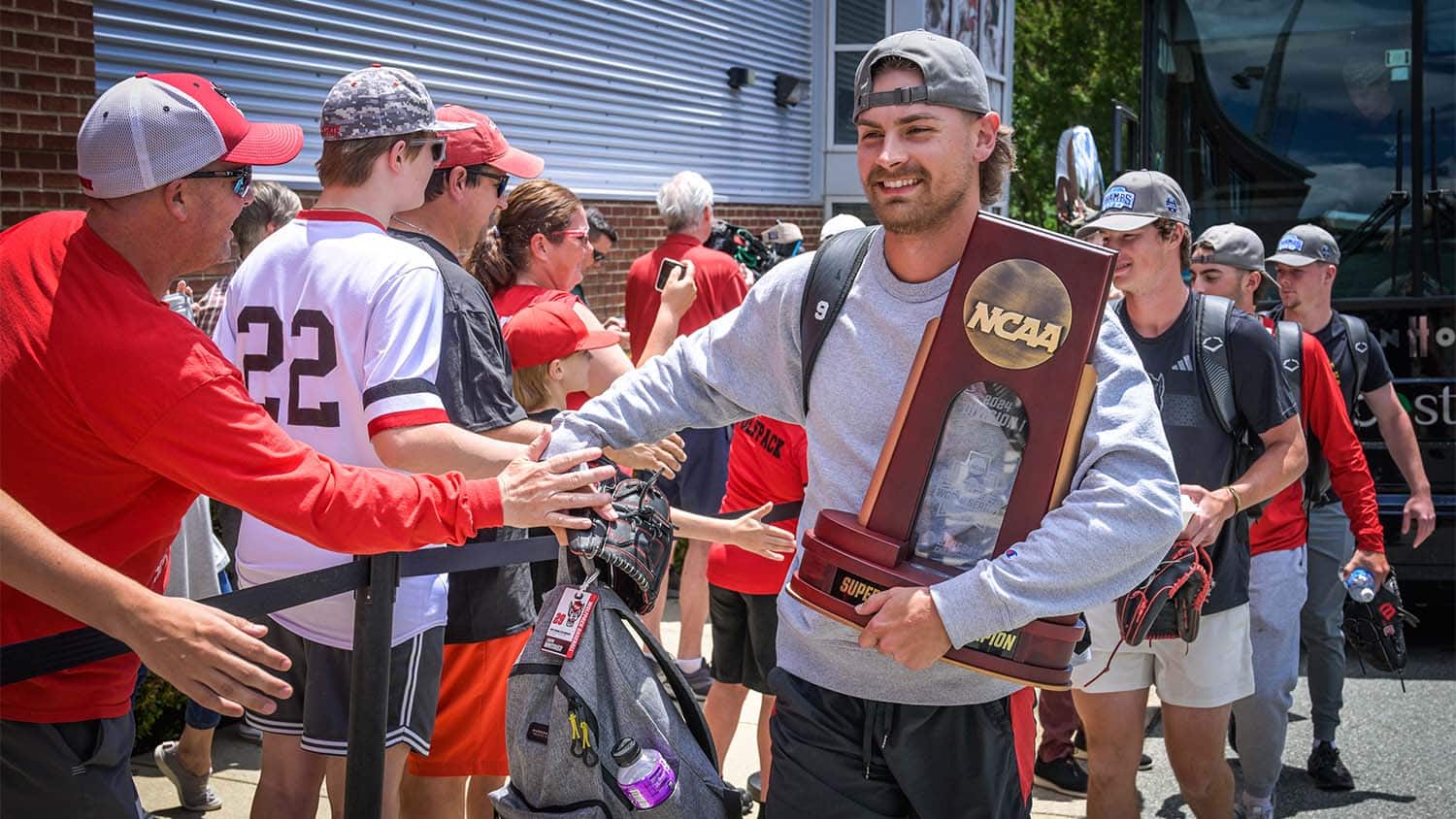Part of the Pack as Employees — and Graduates
Ryan Velazquez and Tania Gavino-Lopez melded theory in the classroom with experience in the field as they worked on campus while pursuing master’s degrees in higher education administration.

Ryan Velazquez and Tania Gavino-Lopez see student life from multiple perspectives.
Velazquez is an employer relations coordinator in the Career Development Center who helps run career fairs and connect employers with students. She also takes students on externships to job sites so they can see them firsthand. On top of that, she is chapter resident director of Pi Beta Phi and lives at the sorority’s house on Fraternity Court with about 40 female students.
Gavino-Lopez, the former college programs specialist with the Shelton Leadership Center who recently left NC State for a new job, helped coordinate and lead student service trips and retreats, oversaw recruitment and held monthly one-on-one advising sessions with students.
At the same time, both women are students themselves, pursuing master’s degrees in higher education administration from NC State’s College of Education. This unique combination of experiences allowed them to meld theory in the classroom with experience in the field.
“As my students were learning, I was learning with them,” Gavino-Lopez says. “I worked at a leadership center, and I was developing my leadership skills with the students. That was an amazing experience.”
Different Paths, Same Destination
Gavino-Lopez and Velazquez have plenty in common. They both entered the master’s program in 2021 and took some classes together as members of the same cohort.
They also both tumbled unexpectedly into higher education. Velazquez entered Ohio State University as a journalism major with dreams of becoming the next Erin Andrews on ESPN. Her interests shifted when her younger brother was tapped to play football and baseball at the University of Michigan.
“During that time, we met, as a family, with a whole bunch of people who were going to help him be recruited,” she recalls. “Some of those people were student-athlete development folks: advisers who work just with athletes, help them choose their classes, pretty much plan their careers, make sure they are on top of it. I thought that was the coolest thing ever.” After that experience, she added a higher education and student affairs minor during her junior year.
Gavino-Lopez enrolled at the University of North Carolina at Chapel Hill and planned on becoming a nurse. She soon switched her major to global studies and then, in her sophomore year, discovered it was possible to build a career in higher education. That became her new goal.
“It just felt right, especially from my personal experience as a Latina, first-generation college student coming from a low-income household,” Gavino-Lopez says. “I told myself, ‘I want to help other people like me.’ I wanted to make sure students who are able to get into college are able to thrive and graduate.”

A Good Mentor
At the Shelton Leadership Center, Gavino-Lopez oversaw most of the programming for the Chancellor’s Leadership Development Program, which supports first-generation college students and those who come from rural counties in North Carolina.
“The position was perfect,” she says. “I got to work with the student population that I’m most passionate about. I was able to be part of their journeys as they grew and thrived.”
Before that, she served two years as a college adviser for UNC-Chapel Hill’s Carolina College Advising Corps. The program puts recent graduates in public high schools throughout the state to provide encouragement and support to students who want to go to college. Gavino-Lopez went first to Dare County and then to her hometown of Burlington.
“It was definitely an honor to serve and give back to the community. But it was also very heartbreaking to see not a lot of things had changed since I had left,” Gavino-Lopez says. Her high school lacked funding and resources; only about 20% of graduates pursue a postsecondary education, she says.
“It was hard coming in, being so eager to want to create change,” she says. “But I am proud to have been given that opportunity to come back and be able to share my story with the students who come from a very similar background as me.”
Being a good mentor matters to Gavino-Lopez because she wished she’d had one at UNC-Chapel Hill — someone who understood her cultural background. At the Shelton Leadership Center, she strove to be a mentor herself, prioritizing personal connections with students in her program. One highlight of her career so far, she says, was when a student for whom she wrote a letter of recommendation was accepted into the McNair Scholars Program. The student thanked Gavino-Lopez for encouraging her to apply and said she would mention her in the acknowledgments when she publishes her first research paper.
“If I hadn’t taken the time to develop that relationship with the student, I don’t know if I would have been her letter of recommendation,” Gavino-Lopez says. “Just being asked to be a letter of recommendation for a student is already so rewarding — to have them see you as the person who can speak the highest of them. That’s why I enjoy doing this work.”
The College Experience
In the Career Development Center, Velazquez advocates for students in a different way. She tells employers that the current crop of students is different from previous ones, namely because of COVID-19.
“I have to explain that these students haven’t had a typical college experience,” she says. “A lot of them were inside doing Zoom for the first two years of college or however long, or they were coming from that in high school. It’s still a transitional period for them. A lot of juniors and seniors are going to career fairs, and they’ve never been to a career fair because they were either virtual or they just weren’t happening. And so it’s a matter of, ‘How do I talk to a human, face to face, who I really want a job from?’”
It’s important to meet students where they are, she says. Velazquez says it helps that, at age 23, she’s so close in age to students herself. COVID-19 interrupted her own experience at Ohio State University, so she understands the difficulties undergrads face. Luckily, she says, the employers she works with are willing to listen. It helps that many of the people she talks to are NC State alumni themselves who understand how valuable the university’s students are. Other employers who may have gone to college elsewhere typically understand that times are different now.
It’s just as important for university employees to meet students where they are, she says, and to understand that their experiences at NC State vary, as do their takeaways once they graduate. One of Velazquez’s grad school classes was specifically about college outcomes for students, exploring questions like: Is job preparedness a priority? How important are community involvement and strong friendships?
“As a career-development person, I would say getting a job is important,” Velazquez says. “I think being culturally competent. Also learning self-actualization and self-identity. I think in my four years, I learned so much about who I am, who I want to be and what my values are. I think I am constantly growing and learning in my cultural competency, but I feel like in college, that’s something that bloomed for me. I think it’s very important for students as well.”
Facing the Future With Confidence
As they prepare to graduate, Velazquez and Gavino-Lopez are looking toward the future. Both see their master’s degrees as the keys to unlock career opportunities in their chosen fields.
Velazquez plans to stay at NC State for now.
“I cannot sing the Career Development Center’s praises enough,” she says. “My boss is a fantastic mentor for me. I truly feel like I’ve learned so much in the past six months here, and I don’t think I’ve even scratched the surface. Eventually I would like to work my way up in the Career Development Center, but I think that’s years down the line.”
She plans to apply to Ph.D. programs in the fall and would like to continue her education at NC State — or if not here then elsewhere in the area so she can stay in Raleigh, a city she has grown to love.
Meanwhile, Gavino-Lopez has already entered the next stage of her career. She has returned to UNC-Chapel Hill and handles communications and student recruitment for the Chancellor’s Science Scholars Program.
“I’m extremely excited and extremely grateful for the opportunity,” she says. “For me, part of it is always being able to give back to where I come from. I’m excited to be able to give back to UNC.”
When the two of them came to NC State, they shared a couple of things in common that they still share as they prepare to graduate: They face the future with optimism and confidence.
“I was so nervous about how things would play out,” Velazquez recalls about coming to NC State. “I didn’t know what life in Raleigh would look like. I was so scared. Looking back now, thinking about that person, I have done a complete 180 in my mindset and my positivity. The future’s unknown, but that’s a gorgeous part of being in the moment and thinking about the future. The plan can be whatever I want it to be.”
Gavino-Lopez, who at one point considered dropping out of UNC-Chapel Hill, was the first in her family to graduate from high school. Then she became the first to graduate from college and now from a master’s program. “Keep going” is her mantra. Thanks to her time at NC State, she made friends and gained mentors, including Professor Krispin Barr, her academic advisor, and Tiffany McLean, associate director of the Shelton Leadership Center.
“Overall, I feel very grateful and excited to see what the future holds,” she says. “I feel like I’m flying off into the world to continue doing great things.”
- Categories:


